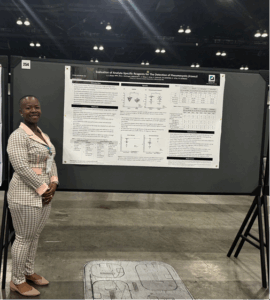Poster Presentation: “Evaluation of Analytic-Specific Reagents for the Detection of Pneumocystis jirovecii” by Lilian Okoye, Infectious Disease, TriCore
Lilian Okoye
July 23, 2025
Lilian Okoye’s poster, “Evaluation of Analytic-Specific Reagents for The Detection of Pneumocystis jirovecii (PJ),” was presented at the American Society of Microbiology (ASM) Microbe Conference 2025 in Los Angeles, California. Showing the process of the quality improvement study for the detection of PJ in patients with suspected PJ pneumonia.
Why This Study Matters
At the intersection of diagnostic microbiology and patient care, the need for accurate and efficient testing methods for Pneumocystis jirovecii (PJ) has never been more urgent. PJ, an opportunistic fungal pathogen, predominantly affects immunocompromised individuals, such as those living with HIV, undergoing chemotherapy, or receiving organ transplants. This population is highly vulnerable to pneumonia caused by PJ, which can lead to significant morbidity and mortality if not diagnosed and treated in a timely manner.
Despite advancements in diagnostic techniques like quantitative polymerase chain reaction (qPCR), uncertainties remain regarding the optimal method for specimen processing. Testing directly from clinical samples or extracting nucleic acids beforehand- has not been adequately explored. This gap is what makes our study particularly important: by optimizing the diagnostic process for PJ detection, we can improve patient outcomes and streamline laboratory workflows.
Key Points and Findings
- Accuracy of Direct PCR Testing: Direct PCR testing from sputum or BAL specimens demonstrated a significantly higher diagnostic accuracy (96.6%) compared to testing after nucleic acid extraction (83.9%). This indicates that bypassing the extraction step not only simplifies the workflow but also enhances the precision of results.
- Impact on Laboratory Workflow: By eliminating the need for DNA extraction, direct PCR testing reduces the complexity of laboratory procedures, improving turnaround time and reducing the resource burden on diagnostic labs. This makes direct testing a more efficient option for laboratories aiming to streamline their processes without sacrificing diagnostic accuracy.
- Clinical Relevance: Our findings have profound implications for clinical practice. The ability to diagnose PJ pneumonia quickly and accurately in immunocompromised patients can significantly improve patient management, allowing for more timely interventions and reducing the risk of complications associated with delayed or incorrect diagnosis.
- Beneficiaries: By adopting direct PCR testing, clinical microbiologists can significantly enhance the accuracy and efficiency of their diagnostic workflows, providing quicker and more reliable results. Accurate and rapid diagnosis of PJ pneumonia will allow infectious disease specialists and clinicians to make informed decisions, enabling them to initiate appropriate treatment sooner, thereby improving patient outcomes. For laboratories, this study presents an opportunity to optimize operational efficiency, as direct testing minimizes procedural complexity, cuts down on reagent use, and reduces both labor and processing time. Ultimately, the most important beneficiaries of these advancements are the patients. Quicker, more accurate diagnoses mean faster treatment and better prognosis; particularly for those who are most vulnerable to PJ pneumonia.
The implications of these results are far-reaching and offer a practical solution to a real-world problem faced by clinicians and laboratories worldwide. By sharing this research, we not only contribute to advancing the field of microbiology but also help healthcare providers make evidence-based decisions that can save lives. The potential to improve patient care through more efficient and accurate diagnostic methods is vast, and we hope to inspire others in the field to explore similar innovations.
